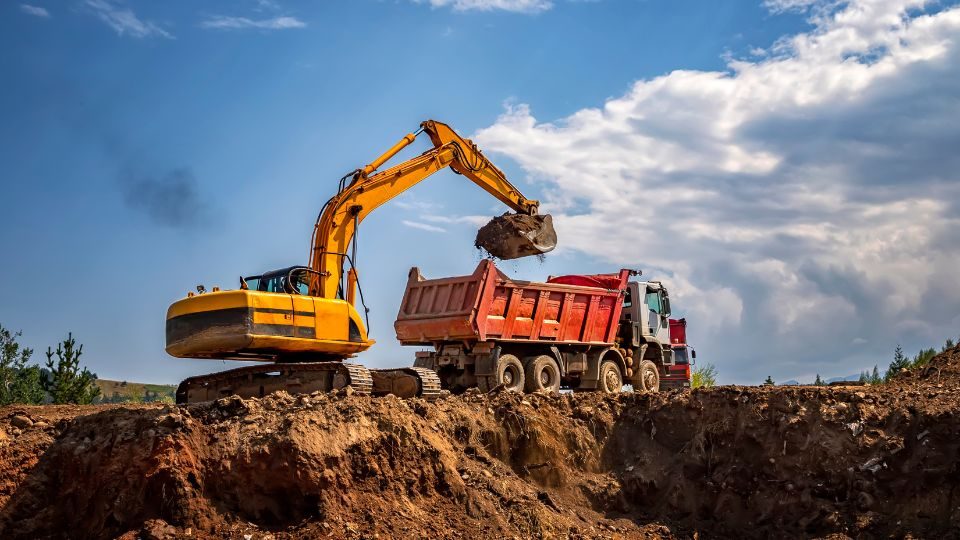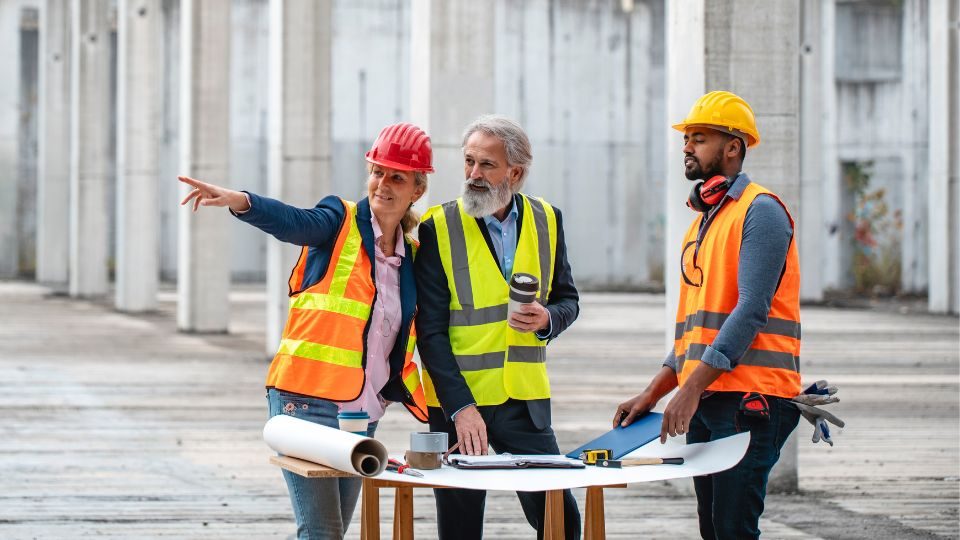A construction ready package increases confidence in construction professionals by enhancing the quality and efficiency of construction projects, lowering costs, and fostering sustainability. This results in higher client satisfaction and a better reputation for industry construction specialists.
Completing job-ready training for construction workers(such as architects, builders, engineers, construction managers,and project managers) has various advantages, including:
- Enhanced Knowledge and Skills: Employees who finish job-ready training better understand industry-specific skills and information, making them more qualified and competent to perform their job obligations.
- Improved Employability: Completing job-ready training can make employees more appealing to future employers by proving their dedication to the industry and readiness to learn and grow.
- Improved Safety Awareness: Job ready training frequently includes occupational safety training, which can help workers be better aware of the dangers they face on the job and how to avoid mishaps.
- Increased Wages: Workers who finish job-ready training may earn higher earnings due to their improved skills and knowledge.
- Career Opportunities: Completing job-ready training can lead to prospects for progression in the construction sector, including supervisory and management roles.
How Do You Prepare To Be A Construction Worker?
You may position yourself for a successful career in the construction sector in Australia if you follow these steps and do the necessary preparation.
Step | Description |
Obtain a high school diploma or equivalent | It is necessary to have a high school diploma or its equivalent for most construction occupations. |
Get vocational training | Consider enrolling in a vocational training programme or an apprenticeship in a construction trade. This will offer you the skills and information required to work in the construction sector. |
To work on construction projects in Australia, construction workers must get a White Card . The White Card certification verifies the completion of approved occupational health and safety training. | |
Gain work experience | Consider beginning your career as a labourer or apprentice to get experience and expertise in the construction business. |
Obtain additional certifications | If you’re looking for an entry-level job in Australia, getting a Vocational Education and Training (VET) certificate is a great way to stand out. You can learn more about the building industry and hone your professional abilities while studying for the certification. You might also hone your technical know-how by participating in guided fieldwork in a niche industry. |
Make your resume unique | The resume you submit with your job applications can always be updated to include the most recent details about your education, qualifications, and employment history. To prove your qualifications for the position, use language directly from the job posting in your cover letter, resume, and list of skills. Make sure the data is useful for building projects. |
Network | Attend industry events, join professional organisations, and network with others who work in the field to build a network of contacts in the building industry. |
What Skills Should I Have For My First Construction Job?
A range of talents and attributes can be advantageous when beginning a construction profession in Australia. These include some of the following:
- Problem-Solving Abilities: Creative problem-solving skills are essential in the construction industry because of the various unforeseen difficulties that can develop during a project.
- Attention to Detail: In building work, paying close attention to detail is essential because even the smallest mistake can have far-reaching effects. You’ll need to be very detailed and careful to ensure that everything is constructed to code.
- Physical Fitness: Construction work can be strenuous on the body. Therefore it helps to be in good shape. You may have to move heavy objects, assume unnatural positions, or operate in harsh conditions as part of your duties.
- Effective Communication: To succeed in a construction career, you must work well with others and communicate clearly and concisely with your bosses and coworkers.
- Technical Understanding: Some construction jobs require specific skill sets and proper training before starting. To be an electrician, for instance, you need to understand how electricity works and be able to decipher technical diagrams and schematics.
- Time Management: Managing Your Time Well and Working Efficiently building projects frequently have strict deadlines, making it essential to manage your time well and work efficiently.
When looking for a construction career in Australia, having a good outlook, a strong work ethic, and a willingness to learn and develop can be helpful.
Can You Work As A Labourer With No Prior Experience?
A lack of experience is not necessarily a barrier to entry for manual labour in Australia. There are many entry-level labourer employment available. While experience is only sometimes necessary, you should be eager to learn and put in the effort.
As a beginner in the construction business, you can be expected to do things like:
- Cleaning up the site
- Moving supplies
- Loading and unloading trucks
- Providing general assistance to more skilled workers
These duties may appear simple at first glance but demand stamina, communication skills, and focus.
Consider taking a White Card course to work as a labourer in Australia. Across Australia, construction sites will not hire workers without a White Card, a nationally recognised qualification. Contact an accredited provider to learn about white card training and passing the required test. This course will introduce you to the fundamentals of the construction business and the kinds of activities you can be asked to complete while working as a labourer, including health and safety procedures.
Although experience is not required to work as a labourer in Australia, a positive outlook, eagerness to learn, and a strong work ethic are all assets in this field.

What Is The Title Of A Construction Worker At The Entry Level?
A construction labourer, also known as a general or unskilled labourer, is often the first job (title) held by someone new to the construction industry. These employees are responsible for various tasks, all of which demand them to be physically strong and stamina and able to follow directions and operate in a team.
Workers in the construction business may be responsible for things like:
- Moving goods: The workers frequently use hand trucks, forklifts, and cranes to transfer heavy materials like lumber, concrete blocks, and steel beams from one area of the working site to another.
- Demolition: They might also be responsible for dismantling old buildings, hauling the rubble, and making way for new development.
- Cleaning and preparation: The workers may have to clean up the site, remove trash and dangerous materials, and smooth out the ground before beginning their construction tasks.
- Helping skilled employees: They may support professional workers like carpenters, electricians, and plumbers by holding objects in place, measuring distances, and laying out plans.
- Equipment operation: Under the supervision of more experienced employees, construction labourers may be asked to operate power tools, saws, and drills.
Construction apprentices, journeymen, and other entry-level workers all play important roles in the business. Their efforts and commitment are crucial to the final product. They may be promoted to higher-level roles with greater autonomy and responsibility as they gain experience and expertise.
Construction Worker Job Description
In Australia, a construction worker helps build, renovate, and maintain buildings, infrastructure, and other structures by performing various manual and technical activities. Some of the duties of an Australian construction worker include the following:
- Helping with construction site preparation: The workers are accountable for preparing the task site, which may entail clearing and levelling the soil, establishing boundaries, and laying out the foundation.
- Operating tools and equipment: The workers may use jackhammers, excavators, and power drills, among other machines and tools, to dig trenches, break up concrete, and install pipes.
- Constructing and assembling structures: The workers may collaborate with other skilled labourers, such as masons and tile setters, to erect buildings and infrastructure.
- Material transportation: The workers use trucks and other machinery to bring lumber, concrete, and steel supplies to the construction site.
- Maintaining and cleaning the working site: Construction employees are responsible for keeping the job site clean and safe, including clearing debris, cleaning up spills, and correctly storing tools and equipment.
- Helping with documentation and other routine activities: Timesheets, safety reports, and equipment maintenance records are all examples of the kind of paperwork that construction employees may be expected to fill out as part of their employment.

How Much Does An Australian Construction Worker Earn?
An Australian construction worker’s pay can vary depending on their experience level, region, and type of work.
A construction worker can expect to make a typical yearly salary of $65,268, according to the talent.com website. This equates to an average hourly wage of $33.47. Salary ranges from $58,769 for entry-level to $74,917 for those with the most experience.
However, it is crucial to remember that this figure is only a rough estimate. Earnings vary greatly depending on industry, qualifications, and region. For example, a construction worker with particular skills and experience may make much more than someone just starting the profession.
What Are The Different Types Of Construction Worker Jobs?
Construction worker occupations include a wide range of tasks and responsibilities, ranging from the construction of new structures to the maintenance and repair of existing ones. The following are some of the several sorts of construction worker jobs:
- General building workers do various construction jobs, including excavation, concrete pouring, framing, roofing, and finishing work, such as painting and tiling.
- Carpenters use wood to construct structures such as buildings, bridges, and decks. They could be responsible for building, roofing, and installing fixtures and fittings like cupboards and trim.
- Electricians install and maintain electrical systems in homes, businesses, and other structures. This could include wiring buildings, installing lighting fixtures, and troubleshooting electrical problems.
- Plumbers install and repair building plumbing systems, which include pipes, fixtures, and appliances such as water heaters and toilets.
- Masons use brick, concrete, and stone to construct walls, foundations, and chimneys.
- Roofers are individuals who install and repair roofs on buildings and other structures. This may include the installation of shingles or other roofing materials, the repair of leaks, and the replacement of damaged roofing components.
- Welders fuse metal parts with heat and pressure to make structures such as bridges, buildings, and pipelines.
- Heavy equipment operators carry materials, excavate foundations, and accomplish other construction activities using heavy equipment such as excavators, bulldozers, and cranes.
- Painters apply paint and other finishing materials to walls, ceilings, and furniture.
- Landscapers create and manage outdoor environments such as gardens, parks, and other public areas.
Road Construction Worker Jobs
Jobs in road construction include new road construction, maintenance of existing roads, and repair of damaged roads. Work in road construction often entails the following duties and responsibilities:
- Using construction machinery: Workers in the road construction industry may operate heavy machinery like excavators, bulldozers, and graders to shift materials, excavate bases, and level off roads.
- Laying road surfaces: Workers in the construction industry may be responsible for putting asphalt, concrete, or other road surfaces and ensuring they are smooth and level.
- Regular maintenance: Workers in the road construction industry may also be responsible for basic maintenance tasks, including filling potholes, replacing broken road signs, and picking up litter along roadways and highways.
- Installing road fixtures: Guardrails, traffic lights, and signage are all examples of road fixtures that workers might use to make the roads safer for vehicles and pedestrians.
- Traffic control: Workers on a road construction project may be tasked with controlling traffic around work zones to ensure the safety of motorists and pedestrians.
- Working outside: In most cases, road building occurs outside, where workers are exposed to the elements, including hot and cold weather.
- Following safety measures: Workers in the road construction industry must adhere to rigorous safety protocols to reduce the likelihood of workplace injuries.
Jobs Hiring Construction Workers
In Australia, numerous enterprises and organisations engage construction workers. These are some places to look for job openings for construction workers jobs in Australia:
- Seek, Indeed, Gumtree, and Australian Government JobSearch are various job search websites that offer a variety of construction worker positions throughout Australia.
- Several construction businesses in Australia publish job openings on their websites, so visiting the career sections of company websites for employment listings is worth visiting.
- Numerous recruitment agencies in Australia specialise in placing construction workers. These organisations can assist job searchers in finding construction worker positions that are a suitable fit for their abilities and expertise.
It should be noted that the hiring process for construction worker positions in Australia varies based on the firm or organisation. Some employers may ask for a resume, cover letter, and references, but others may have their application process. Before applying for a construction worker job in Australia, research the firm or organisation and its recruiting process.

Jobs For Older Construction Workers
There are numerous career prospects for senior construction workers who want to continue working and earn a living. While some may believe that construction work is only for younger individuals, the truth is that employers greatly respect and seek out expertise and abilities obtained over years of working in the field.
Possible job possibilities for senior construction workers include:
- Project managers: Older construction employees with years of expertise can move into project management responsibilities. Project managers are responsible for overseeing the construction process and ensuring that the project is completed on time, without going over budget, and by the requirements outlined by the client.
- Inspectors: Inspectors ensure that building projects are per building rules, zoning laws, and other requirements. Older workers with a construction history can use their experience to become inspectors for government organisations or private enterprises.
- Trainers: Experienced construction workers can become trainers, teaching new workers the skills they need to succeed. This can include things like safety training and on-the-job training.
- Consultant: Elderly construction workers can also serve as consultants, advising businesses on best practices, safety measures, and other topics. This can be accomplished as a freelancer or by establishing a consulting firm.
How Construction Ready Package boosts Trust In Construction Professionals
A construction ready package increases confidence in construction professionals (such as architects, builders, engineers, and project managers) by enhancing the quality and efficiency of construction projects, lowering costs, and fostering sustainability. This results in higher client satisfaction and a better reputation for industry construction specialists.
Construction Industry Safety Training
The construction sector in Australia places a great focus on safety. As a result, several safety training programmes are provided to industry workers. These programmes are intended to assist workers in understanding and adhering to safety rules, preventing accidents and injuries, and fostering a safe and healthy work environment.
Some of the more popular safety training programmes in Australia’s construction business include the following:
- White Card Training: This is a necessary safety training programme for all Australian construction workers. It covers the fundamentals of workplace health and safety, such as detecting and controlling dangers, comprehending safety legislation and standards of practice, and employing personal protective equipment (PPE).
- Working at Heights Training: This programme is meant to help workers understand the risks associated with working at heights and how to use safety equipment such as harnesses and lanyards correctly. It is mandatory for workers operating at heights of two metres or greater.
- Confined Space Training: Those who may be needed to work in enclosed spaces, such as tanks or trenches, benefit most from this training session. It addresses the hazards of working in tight places, the usage of protective equipment, and rescue procedures.
- Asbestos Awareness Training: This programme is required for workers who may come into contact with or be near asbestos-containing items. It discusses the health dangers of asbestos exposure and how to identify asbestos-containing products and safe work techniques.
- Cement Hazard Training: Since the cement is widely used in the construction sector, workers may be exposed to cement-related risks such as skin and eye irritation, respiratory difficulties, and chemical burns. The training programmes aim to educate personnel on properly handling and using cement and the associated hazards.
- Dogging, Rigging, and Lifting training: Dogging, rigging, and lifting safety training programmes attempt to educate personnel on safe techniques for these operations. This training usually includes equipment selection and inspection, safe lifting practices, and communication during lifting activities.
Overall, safety training is an important component of the Australian construction business. Workers are encouraged to use numerous training programmes, including awareness of safety signs, to work safely and successfully.
How Construction Companies Ensure Workplace Health
Employers in the Australian construction business have a legal responsibility to protect their employees’ well-being on the job. Companies in the Australian construction business take many precautions to protect their employees’ health and safety on the job:
- Risk analysis: An organisation’s risk assessment is the process by which it identifies potential dangers and rates the severity of those dangers. With this information, they can take steps to reduce or eliminate risks.
- SWMS: A SWMS is a document that details the potential risks of a given work and the procedures that will be taken to eliminate or reduce those risks.
- Training: To ensure their employees know the dangers they face and how to deal with them, businesses give them safety training and instruction.
- PPE: Several items of PPE, including hard hats, safety glasses, gloves, and high visibility apparel, are provided to employees by their employers.
- Regular Inspections: Frequent inspections are conducted to detect and address any risks or harmful workplace procedures.
Occupational health and safety committees are established by businesses to provide employees with a voice in matters of workplace safety and to facilitate open dialogue on these topics.

